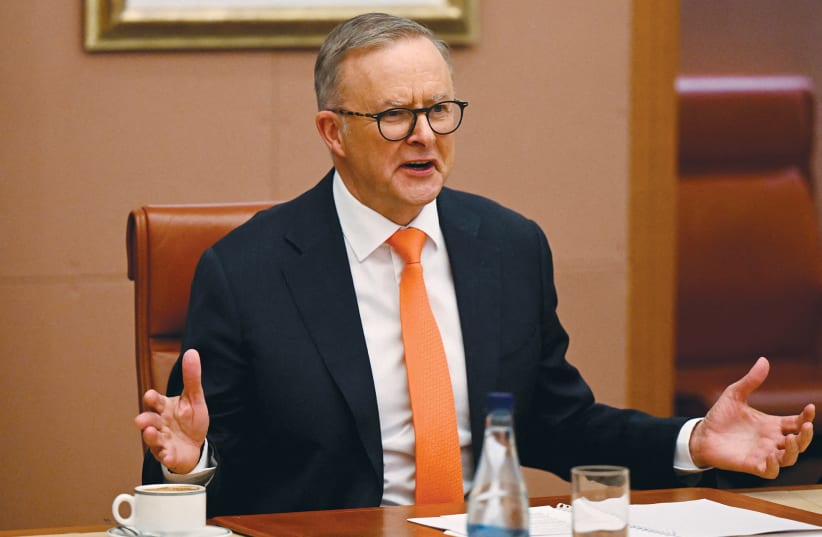Australia’s decision to withdraw recognition of western Jerusalem as the capital of Israel was met with uproar in Israel, this past week.
Prime Minister Yair Lapid slammed the move and the Foreign Ministry director-general called the decision wretched, in a dressing down of the Australian ambassador. Now, Israeli officials fear that Canberra’s next step will be to recognize a Palestinian state.
In a statement last Tuesday announcing the reversal, Australian Foreign Minister Penny Wong insisted that Jerusalem’s status must be resolved in peace negotiations between Israel and the Palestinians and that the recognition of Jerusalem had caused conflict and distress in government.
She also accused former prime minister Scott Morrison of pandering to Jewish votes in the original decision. “You know what this was? This was a cynical play, unsuccessful, to win the seat of Wentworth and a by-election,” she said, referring to the beach-side Sydney suburb.
Australia recognized western Jerusalem as Israel's capital in 2018

Australia recognized the western half of the Holy City as Israel’s capital in 2018 under Morrison, a staunch pro-Israel ally and head of the former coalition, an alliance of center-right parties. Under the former prime minister, the government consistently voted in favor of Israel at the UN and sidelined the local BDS movement.
Morrison was voted out of office in May, bringing the Center-Left Labour party into power, headed by current Prime Minister Anthony Albanese. Albanese has a checkered track record in Israel. While in the lead-up to the election, he claimed that “Israel will have Australia’s friendship and support,” he’s also referred to Israel as an oppressor and collectively punishing the residents of Gaza. He also labels himself as a strong advocate of justice for Palestinians.
Albanese does not appear to be ideologically opposed to Israel, unlike his counterpart, former UK Labor head Jeremy Corbyn. In the past, he has denounced the BDS movement for its racial undertones and dismissed attempts to apply the apartheid analogy. The new premier also pledged to endorse the International Holocaust Remembrance Alliance (IHRA) definition of antisemitism, which classifies the demonization of Israel as antisemitic.
During the flare-up of violence between Israel and Hamas in May 2021, Wong decried Israeli settlement expansion and annexation. Calling herself a strong supporter of both Israelis and Palestinians, Wong released a statement calling on all sides to de-escalate.
These examples and others reveal internal disagreements within Labour regarding its positioning around Israel.
Now Israel fears that Australia’s reversal on Jerusalem could pave the way for the full-blown recognition of a Palestinian state. The Federal Labour Party, which won a majority in parliament, has promised to recognize a Palestinian state in its national platform.
Over the years, Israel has enjoyed bipartisan support in Canberra, as both major parties toed a US foreign-policy line of advocating for a two-state solution while backing Israel at the United Nations.
Of the 118,000-strong Jewish population in Australia, only one in five politically aligns with Labour, according to a 2017 survey by the Australian branch of the left-leaning New Israel Fund. Over half have stated they vote for the Liberal party.
Zionist Federation of Australia president Jeremy Leibler noted that the Labor party is an integral part of the bipartisan consensus on Israel and remains a great friend of the Australian Jewish community.
Israeli-Australian human rights lawyer Arsen Ostrovsky said he expects to see a cooling down of the enthusiasm for Israel, including more abstentions at the UN and pressure on Israel to make further concessions.
Another key concern for the Jewish community is the rise of antisemitism. There was a 35% increase in recorded antisemitic incidents throughout 2021 (with a sharp rise during the Israel-Hamas skirmish in May), in comparison with the previous year, according to the Executive Council of Australian Jewry (ECAJ).
As for the Jerusalem debacle, the policy U-Turn came while the Australian Jewish community was offline celebrating the Jewish holiday of Simhat Torah and Jewish organizations were unable to immediately respond.
When back online, the ECAJ lamented that the decision was performed without public consultation or debate, and called it poor policy, clearly media driven, and pandering to the most extreme elements of the Labor party.
As ties strain, it is imperative that all those invested in the Australia-Israel relationship, from civil society to the halls of parliament, come together to clarify the importance of this relationship, based on mutual respect, interests and shared democratic values.
The writer is a Center for Jewish Impact fellow, who made aliyah from Australia.
